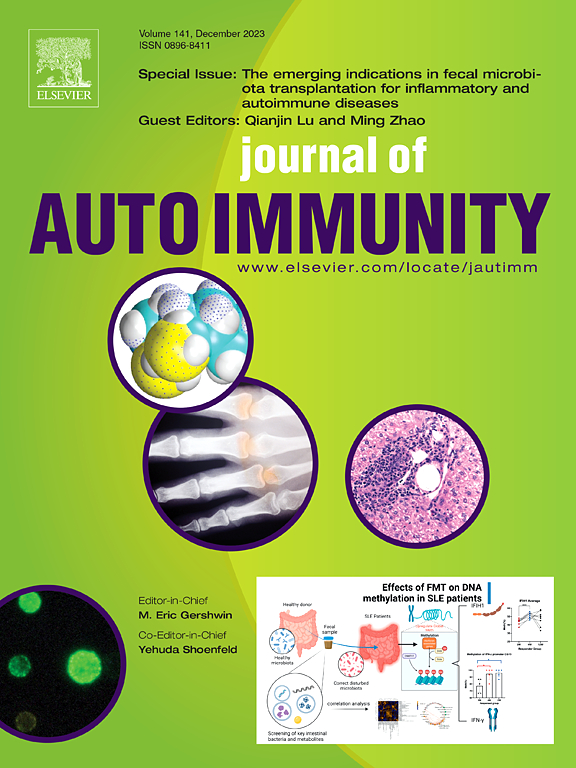Passive maternal immunity in children born to women with systemic autoimmune rheumatic disease – A case-control study
IF 7
1区 医学
Q1 IMMUNOLOGY
引用次数: 0
Abstract
Introduction
The transplacental transfer of maternal antibodies is essential for neonatal immunity but can be affected by maternal health conditions and pregnancy complications. In women with systemic autoimmune rheumatic diseases (SARD) this transfer may be influenced by the autoimmune condition itself and/or the immunosuppressive therapies administered during pregnancy.
Objective
This study aimed to assess the transplacental transfer and efficacy of vaccine-induced antibodies in pregnant women with SARD compared to healthy controls.
Methods
We enrolled pregnant women with and without SARD pregnancy. Venous blood samples were collected during the third trimester, and umbilical cord blood was obtained postpartum. Antibody titers were assessed using Roche SARS-CoV-2 RBD ECLIA for SARS-CoV-2 and DiaSorin kits for varicella-zoster virus and rubella.
Results
25 pregnant women with SARD and 30 healthy controls were analyzed. Of these, 25 women were vaccinated against SARS- CoV-2 during pregnancy. Transplacental antibody transfer was effective in the SARD and in the control groups. Rubella and SARS-CoV-2 antibody levels showed no significant differences in either maternal or cord blood samples. Varicella-zoster virus antibody levels were higher in SARD maternal and cord sera than in controls. In all cases maternal and neonatal antibody titers were highly correlated (p < 0.001).
Conclusions
Our findings suggest effective maternal-to-fetal antibody transfer in women with SARD both for existing antibodies (varicella-zoster virus, rubella) as well as newly generated ones (anti-Covid Igs generated after vaccination during pregnancy), indicating robust passive immunity in their newborns.
患有系统性自身免疫性风湿病妇女所生儿童的被动母体免疫-一项病例对照研究
母体抗体经胎盘移植对新生儿免疫至关重要,但可能受到母体健康状况和妊娠并发症的影响。在患有系统性自身免疫性风湿病(SARD)的妇女中,这种转移可能受到自身免疫性疾病本身和/或妊娠期间给予的免疫抑制治疗的影响。目的比较SARD孕妇与健康对照者的胎盘移植及疫苗诱导抗体的效果。方法纳入有和无SARD妊娠的孕妇。在妊娠晚期采集静脉血,产后采集脐带血。采用罗氏SARS-CoV-2 RBD ECLIA试剂盒检测SARS-CoV-2抗体滴度,采用水痘-带状疱疹病毒和风疹的DiaSorin试剂盒检测水痘-带状疱疹病毒和风疹。结果对25例SARD孕妇和30例健康对照进行了分析。其中,25名妇女在怀孕期间接种了SARS- CoV-2疫苗。经胎盘抗体转移在SARD组和对照组均有效。在母体和脐带血样本中,风疹和SARS-CoV-2抗体水平均无显著差异。SARD产妇和脐带血清中水痘带状疱疹病毒抗体水平高于对照组。在所有病例中,母亲和新生儿抗体滴度高度相关(p <;0.001)。结论SARD患者既有抗体(水痘-带状疱疹病毒、风疹),也有新生抗体(妊娠期接种疫苗后产生的抗covid - Igs),母体-胎儿抗体转移有效,新生儿具有较强的被动免疫能力。
本文章由计算机程序翻译,如有差异,请以英文原文为准。
求助全文
约1分钟内获得全文
求助全文
来源期刊

Journal of autoimmunity
医学-免疫学
CiteScore
27.90
自引率
1.60%
发文量
117
审稿时长
17 days
期刊介绍:
The Journal of Autoimmunity serves as the primary publication for research on various facets of autoimmunity. These include topics such as the mechanism of self-recognition, regulation of autoimmune responses, experimental autoimmune diseases, diagnostic tests for autoantibodies, as well as the epidemiology, pathophysiology, and treatment of autoimmune diseases. While the journal covers a wide range of subjects, it emphasizes papers exploring the genetic, molecular biology, and cellular aspects of the field.
The Journal of Translational Autoimmunity, on the other hand, is a subsidiary journal of the Journal of Autoimmunity. It focuses specifically on translating scientific discoveries in autoimmunity into clinical applications and practical solutions. By highlighting research that bridges the gap between basic science and clinical practice, the Journal of Translational Autoimmunity aims to advance the understanding and treatment of autoimmune diseases.
 求助内容:
求助内容: 应助结果提醒方式:
应助结果提醒方式:


